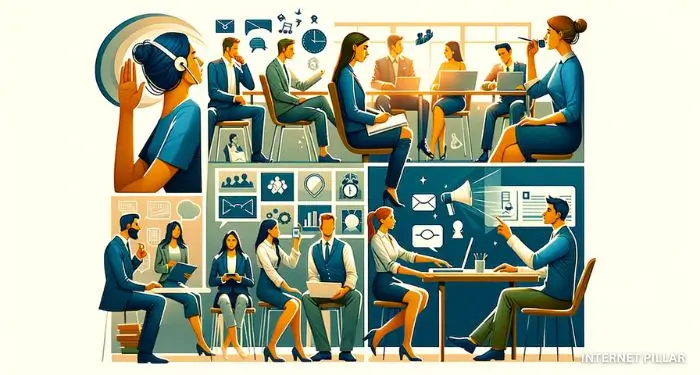Communication is extremely important for connecting people and sharing ideas, thoughts and information.
It’s vital in various professional settings like presentations, team discussions and client meetings.
More than just talking and listening, it’s a core skill for positive relationships at work. In the workplace, communication is key.
It’s how we collaborate and share opinions. Good communication skills can set you apart from others and are essential for leadership and success at all levels.

Leaders like Steve Jobs, Jack Welch and Jeff Bezos excel because of their communication skills.
This article provides 17 tips to improve your communication skills.
17 Proven Tips To Improve Communication Skills
1. Eye Contact: Key to Engagement
Maintaining eye contact during a conversation is important. It shows interest, confidence and trustworthiness.
When you talk, try to hold steady eye contact instead of looking around, as it strengthens the connection with your audience.
2. Understanding Body Language

About 65% of communication is nonverbal. Observe if your listener understands or disagrees with you through their body language.
Similarly, be conscious of your own signals. Adopt open body language, like uncrossed arms and relaxed shoulders, to convey the right message.
3. Practice Speaking Out Loud
Improving communication skills comes with practice.
Speaking out loud, especially in front of a mirror, helps you notice nuances in your tone, facial expressions and hand movements.
This practice is not about memorizing what to say, but about becoming comfortable with your speech and expressions.
4. Know and Respect Your Audience
Understanding and respecting your audience is vital. Never underestimate them.

Pay attention to who they are and tailor your message accordingly.
Respecting your audience ensures that your message is received in the best possible way.
5. Highlight Key Points at Start and End
Remember the importance of clear communication, as shown in the “tappers and listeners” study.
To make sure your audience grasps the main ideas, emphasize key points at both the beginning and end of your presentation.
Providing a one-pager summary can also help attendees retain the main points.
6. Showing Genuine Interest

People enjoy talking about their own experiences and feelings. When someone shares something important with you, engage with them.
Ask them to elaborate and avoid redirecting the conversation to yourself.
This approach strengthens your bond with them, enhances your likability and establishes you as a good listener.
7. Seeking and Giving Feedback
Regularly asking for feedback ensures your message is clear and understood. If necessary, repeat your points.
Focus on making your audience feel valued and involved in the discussion.
8. Mindful Tone of Voice
Adjusting your speaking pace to be slightly slower than your conversation partner can make you more likable. Additionally, using your voice to express emotions makes you appear more dynamic and engaging.
9. Ensuring Clarity in Communication
If someone doesn’t understand you, don’t blame them. Instead, find alternative ways to express your thoughts so they can grasp your perspective, especially in a work environment.
10. Stay Positive in Communication

In the workplace, it’s vital to maintain a positive attitude, even on bad days.
You might be having a tough time, but that’s no excuse to behave poorly with colleagues.
Keeping interactions cheerful and engaging positively impacts both you and your audience.
11. The Power of Saying “No”
Learning to say no is important. It allows you to express your true feelings and ensures your opinions are heard.
Practice different ways to say no and stand your ground in various situations.
12. Encourage Clarifications
If something is unclear or sparks your interest, don’t hesitate to ask for more details. This shows respect for the speaker’s intelligence and acknowledges your active listening and interest in the discussion.
13. Balanced Use of Visual Aids
Visual aids can enhance presentations, but they shouldn’t be the sole focus. Over-reliance on these tools can distract from the main message.
It’s more effective to engage the audience with your voice and expressions, becoming an integral part of the content you’re presenting.
14. Reflect on Conversations
After listening to someone speak at length, summarize their points.
This demonstrates your attentiveness and understanding of the subject, showing respect for the speaker’s effort.
15. Seek Honest Feedback
For effective communication and leadership, it’s essential to ask for and value honest feedback from peers, managers and team members.

Regular feedback can reveal areas for improvement that you might not have noticed on your own.
16. Authenticity is Key
Genuine communication is more effective than using many techniques without sincerity.
Being true to yourself in your interactions will usually be met with positive responses from others.
17. Always Think Before You Speak
Before replying, take a moment to think.
This practice helps avoid hasty or poorly thought-out responses, leading to clearer, more thoughtful communication.
What are Communication Skills?
Communication skills mean being able to clearly and effectively share your thoughts with others without losing their interest.
Many people think this just involves speaking English well, but it’s more than that.

We’ve been communicating since we were kids, learning from those around us. But the way we talk with family or friends often doesn’t work in places like work or school.
The way you chat with your boss or a professor should be different than how you talk with friends. Understanding these differences is crucial.
The word “communication” comes from Latin and means “to share.”
Wikipedia describes it as conveying meanings through signs, symbols and rules that everyone understands.
Communication skills are basically the methods you use to share ideas with others. Being able to deliver messages clearly, without errors and in a way that keeps people interested is key.
However, just knowing this doesn’t make you an expert communicator. There are many essential communication skills and new ways to express ourselves are always emerging.
Why are Communication Skills Important?
Improving communication skills is important in many areas of life and work.
In job performance it’s more than just completing tasks well; it’s integral to all job aspects.

With the rise of remote work the need for clear communication has become even more important to ensure smooth collaboration without face-to-face interaction.
For those in client-facing roles effective communication is key to presenting services, addressing concerns and maintaining strong relationships.
Leadership positions demand strong communication skills for conveying ideas providing feedback, mentoring and problem-solving.
In teamwork effective communication is essential for discussing issues, collaborating on solutions, building relationships and streamlining workflow.
Effective communication isn’t about luck but involves sharing thoughts achieving goals expressing feelings resolving conflicts and persuading others.
It helps in understanding others and their perspectives leading to better actions and fewer misunderstandings.
It also promotes personal growth making one a better team player and deepening understanding of work and team members.
Furthermore it builds honesty and integrity helping to avoid workplace politics.
Types Of Communication Skills
Here are some of the main types of communication skills:
1. Verbal Communication
This involves sharing ideas through speech. It happens in presentations one-on-one chats and virtual meetings.
2. Written Communication
It’s key for expressing ideas through emails notes reports and other written formats.
3. Non-Verbal Communication
This includes facial expressions body language and tone all crucial for conveying messages without words.
4. Active Listening
A vital part of communication it involves understanding engaging and responding to the speaker.
Top Professional Communication Skills
Here are some of the top professional communication skills:
1. Public Speaking
Public speaking is important in professional settings like presentations and meetings. It’s essential for being taken seriously.
However, many struggle with stage fright, making mastering this skill vital for career progress.
2. Articulation
Clear, articulate speech is key in professional environments.
Avoiding slurred words and lisps is important to prevent misunderstandings and ensure clear communication.
Articulation can significantly influence career opportunities and promotions.
3. Language
Using professional language is essential. Regardless of dialects, choosing formal yet understandable words is important.
Avoid slang and remember that language reflects your background.
It should be embraced but not hinder productivity.
4. Non-Verbals
Non-verbal cues like body language and eye contact can significantly impact communication.
They can alter the meaning of spoken words, turning a request into an order.
Being aware of your own and others’ non-verbal signals is important in public settings.
So that’s it for this article on improving communication skills.



